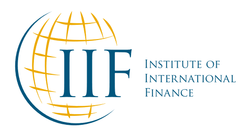Institute of International Finance
The Institute of International Finance, Inc. (IIF) is a global association or trade group of financial institutions. It was created by 38 banks of leading industrialized countries in 1983 in response to the international debt crisis of the early 1980s, and is the "leading voice for the financial services industry on global regulatory issues."[1]
Its reports have been used as roadmaps to manage crises to the advantage of the finance industry.
Overview
It has more than 450 members from more than 70 countries[2]. Its mission is to support the financial industry in the prudent management of risks; to develop sound industry practices; and to advocate for regulatory, financial and economic policies that are in the broad interests of its members and foster global financial stability and sustainable economic growth. IIF members include commercial and investment banks, asset managers, insurance companies, sovereign wealth funds, hedge funds, central banks and development banks.
Greek Crisis
A document from the IIF was used by politicians as a guide (roadmap) to decide how large the participation of private banks should be in debt relief for Greece[3]. The IIF therefore demanded "additional resources from European taxpayers" to save Greece[4]. The IIF proposed three different models:
- Exchange of bonds: Outstanding bonds are to be replaced by new bonds with lower interest rates and longer terms. This is secured by a fund financed by Greece or by the EFSF (European Financial Stability Facility), i.e. European taxpayers. As a result, the private banks have no direct losses and, moreover, have a low risk of loss.
- Exchange at a discount: Banks could redeem outstanding bonds at prices well below their value and replace them with new bonds with longer terms. The interest on the bonds is based on the market interest rate. This is also secured by the EFSF, which is borne by European taxpayers.
- Buyback: Greece is buying back Greek bonds from the market through an agency to be set up. This was to be financed by the EFSF or by loans from other countries.
The chairman of the IIF Josef Ackermann took part in the summit at which the conditions for the rescue of Greece were decided. The economist and economist Peter Bofinger stated: "The banks and insurance companies contribute zero percent to the rescue of Greece. They are the winner of the summit negotiations[5]." Bofinger concluded: "The bank lobby was well represented at the summit. They asserted their interests very well."[6]
Board
The board members represent 30 of the most powerful financial institutions in the world[7]
Known members
13 of the 44 of the members already have pages here:
| Member | Description |
|---|---|
| Ana Botín | Head of Santander Group, who claimed that COVID-19 Vaccines are “the most effective 2021 economic policy.” |
| Oliver Bäte | German businessman with supranational deep state connections |
| Douglas J. Flint | HSBC chair, multi-Bilderberg |
| Ralph Hamers | Attended the 2017 Bilderberg as ING CEO'. Prosecuted for massive corruption at ING concerning at least $1,25 billion. Even after the settlement with ING, the Dutch court prosecuted Hamers personally in 2020. |
| Walter Kielholz | a Swiss insurance and bank manager with extensive networks |
| Frédéric Oudéa | French financier |
| Urs Rohner | banker |
| Alison Rose (banker) | Banker who resigned as NatWest Group CEO |
| Christian Sewing | Attended multiple WEF AGMs as CEO of Deutsche Bank |
| Jes Staley | Suddenly quit as Barclays CEO after a probe relating to his ties with his friend Jeffrey Epstein |
| Mark Tucker | businessman/banker Bilderberger |
| John Waldron | President and Chief Operating Officer of The Goldman Sachs Group, Inc. |
| Axel Weber | G30 central banker |
References
- ↑ https://www.iif.com/about-us
- ↑ https://www.iif.com/membership/our-member-institutions
- ↑ http://online.wsj.com/article/SB10001424052702303812104576441853016246930.html
- ↑ https://web.archive.org/web/20111207231505/http://www.ftd.de/politik/europa/:schuldenkrise-bruessel-sucht-nach-der-grossen-loesung/60078699.html
- ↑ http://www.wiwo.de/politik-weltwirtschaft/banken-beteiligen-sich-null-prozent-an-der-griechen-rettung-474476/print//
- ↑ http://www.makro.wiwi.uni-due.de/fileadmin/fileupload/VWL-MAKRO/Presse/2011/OEkonomen_schuetteln_den_Kopf_ueber_Banken-Beteiligung_-_WirtschaftsWoche.pdf
- ↑ https://www.iif.com/About-Us/Our-Board
